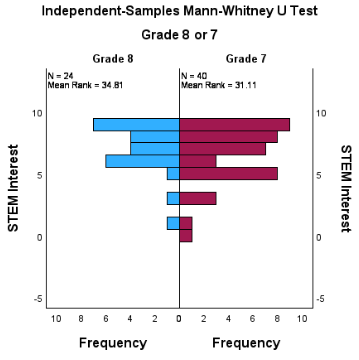Fostering STEM Learning: Exploring the Integration of Design Thinking in Islamic STEM Education
DOI:
https://doi.org/10.23917/qist.v3i3.6138Keywords:
STEM learning, Islamic Education, Design Thinking, Middle school studentsAbstract
This study investigates the integration of Design Thinking in STEM education within an Islamic context, focusing on thermal packaging as a learning module. The research examines differences in STEM Interest, Design Thinking skills, and Subject Knowledge across 7th and 8th-grade students, as well as the relationships between these constructs. A quantitative approach was employed, involving 64 preparatory students from an institute of religious studies in Qatar. Participants engaged in a Design Thinking-based STEM workshop on thermal packaging, followed by a comprehensive survey assessing the three key constructs. The Independent-Samples Mann-Whitney U Test revealed no significant differences between grade levels for STEM Interest (U = 424.500, p = .434), Design Thinking skills (U = 494.000, p = .843), or Subject Knowledge (U = 469.500, p = .873). However, bivariate correlation analysis showed strong positive relationships among the constructs for both grade levels. For 7th-grade students, STEM Interest and Design Thinking Skills were strongly correlated (r = 0.856), while 8th-grade students showed a robust correlation between Design Thinking Skills and Subject Knowledge (r = 0.884). These findings suggest that integrating Design Thinking approaches in STEM education within an Islamic context can effectively enhance students' interest, skills, and knowledge simultaneously. The study highlights the potential of Design Thinking-based STEM workshops to create a synergistic learning environment that aligns with Islamic principles and values while preparing students for contemporary challenges. The research contributes to the growing body of literature on culturally responsive STEM education and provides insights for educators seeking to bridge traditional Islamic teachings with modern technological advancements.
References
L. Halim, A. Ahmed, S. Hassan, and N. Rahman, "Integrating STEM in Islamic Education: Enhancing Students' Problem-Solving Skills and Religious Understanding," Journal of Islamic Education, vol. 45, no. 2, pp. 178–195, 2021.
F. Rahim, N. H. Ismail, and S. Z. Omar, "STEM Education in Islamic Schools: A Holistic Approach to Knowledge Integration," International Journal of Islamic and Civilizational Studies, vol. 7, no. 1, pp. 58–72, 2020.
P. Aswirna and R. Fahmi, "Cognitive Development through STEM-Integrated Islamic Education: A Study of Secondary School Students," International Journal of Islamic Education, vol. 10, no. 1, pp. 45–62, 2022.
K. A. Latif, M. A. Islam, I. M. Noor, and A. Sakor, "Developing Critical Thinking Skills Through STEM Activities in Islamic Education: A Quasi-Experimental Study," International Journal of Instruction, vol. 14, no. 1, pp. 527–544, 2021.
M. M. Rahman, H. Ali, and N. Siddiqui, "Fostering Innovation and Entrepreneurship in Islamic Higher Education through STEM Integration," Journal of Islamic and Scientific Research, vol. 8, no. 3, pp. 301–318, 2020.
N. M. Zain, N. A. Shukor, and Z. Abdullah, "Implementing Project-Based Learning in Islamic STEM Education: Challenges and Opportunities," Journal of Islamic Education and Technology, vol. 3, no. 2, pp. 125–141, 2021.
N. M. Salleh, M. Ibrahim, and Z. Abdullah, "Enhancing Metacognitive Abilities through STEM-Integrated Islamic Education," Muslim Education Quarterly, vol. 40, no. 1, pp. 22–39, 2023.
J. Ahmad, M. F. Ashaari, and G. Hardaker, "Bridging Faith and Science: The Role of STEM in Modern Islamic Curriculum," Educ Sci (Basel), vol. 12, no. 4, p. 254, 2022.
R. Mustapha and M. J. Salleh, "Integrating STEM Education in Malaysian Islamic Schools: Teachers' Perspectives and Challenges," International Journal of Academic Research in Progressive Education and Development, vol. 8, no. 4, pp. 32–47, 2019.
M. Yaacob, R. Embong, and A. N. M. Zain, "Promoting Islamic Values Through STEM Education: A Case Study of Malaysian Religious Schools," International Journal of Academic Research in Business and Social Sciences, vol. 10, no. 7, pp. 691–703, 2020.
T. S. A. T. Kasim and F. S. Abdurajak, "Issues and Challenges in Integrating Islamic Values in STEM Education: An Analysis from Teachers' Perspective," Al-Shajarah: Journal of the International Institute of Islamic Thought and Civilization (ISTAC), pp. 155–180, 2018.
K. Mohd-Yusof, A. N. Sadikin, F. A. Phang, and A. Abdul Aziz, "Instilling Islamic Values in Engineering Education Through a Problem-Based Learning Approach," International Journal of Engineering Education, vol. 36, no. 2, pp. 614–624, 2020.
L. D. English and D. T. King, "STEM integration in sixth grade: Designing and constructing paper bridges," Int J Sci Math Educ, vol. 17, no. 5, pp. 863–884, 2019.
J. Pleasants and J. K. Olson, "What is engineering? Elaborating the nature of engineering for K‐12 education," Sci Educ, vol. 103, no. 1, pp. 145–166, 2019.
N. H. Ramli, M. M. Amin, and H. Hashim, "Integration of Islamic Values in Engineering Education: A Review," International Journal of Engineering Education, vol. 36, no. 1A, pp. 164–176, 2020.
B. Malkawi, E. Malkawi, and H. Baniatta, "Islamic Engineering: Past, Present, and Future," International Journal of Engineering Pedagogy, vol. 11, no. 2, pp. 130–149, 2021.
S. M. N. Al-Attas and S. S. Al-Attas, "The Concept of Education in Islam: A Framework for an Islamic Philosophy of Education," International Institute of Islamic Thought, 2019.
N. A. Shukor, Z. Tasir, and H. Van der Meij, "An examination of STEM education implementation in Islamic schools in Malaysia," J Sci Educ Technol, vol. 30, no. 2, pp. 239–251, 2021.
Y. Rahmawati, C. S. Chai, and M. S. Y. Jong, "Implementing STEM in Islamic elementary schools: Teachers' perceptions and instructional practices," Int J Sci Math Educ, vol. 18, no. 8, pp. 1439–1459, 2020.
D. Akgündüz and H. Ertepınar, "STEM education in Imam Hatip schools: A mixed methods study," Journal of Education in Muslim Societies, vol. 1, no. 1, pp. 77–102, 2019.
M. A. Khan and S. Rodrigues, "STEM in madrasahs: Challenges and opportunities in Pakistan's Islamic education system," Compare: A Journal of Comparative and International Education, vol. 53, no. 2, pp. 254–271, 2023.
A. Alblooshi and I. M. Alghazo, "Integrating STEM and Islamic values in UAE schools: A case study approach," Int J Sci Educ, vol. 44, no. 3, pp. 452–470, 2022.
T. Al-Thani, E. Al-Muftah, M. H. Romanowski, C. Coughlin, and H. Abuelhassan, "Bridging Islamic values and STEM education: A case study of Qatar," Int J Sci Educ, vol. 43, no. 14, pp. 2411–2433, 2021.
N. M. Zain, N. A. Shukor, and Z. Abdullah, "Design Thinking in Islamic STEM Education: Fostering Innovation and Problem-Solving," International Journal of Islamic Education, vol. 5, no. 2, pp. 87–103, 2020.
F. Rahman and N. Akhter, "Enhancing Innovative Capacity through Design Thinking Workshops in Islamic Schools," Journal of Islamic Education and Creativity, vol. 3, no. 1, pp. 45–62, 2021.
S. Alhamdan, H. M. Ali, and M. S. Hassan, "Integrating Design Thinking in Islamic Studies Curricula: A Case Study of Saudi Universities," International Journal of Islamic Higher Education, vol. 7, no. 2, pp. 201–218, 2022.
G. Nurdin, R. Ismail, and N. M. Yusof, "Design Thinking for Islamic Educational Technologies: Bridging Tradition and Innovation," Journal of Educational Technology in Islamic Context, vol. 2, no. 1, pp. 15–32, 2023.
H. Al-Samarraie, A. Shamsuddin, and S. Ghazal, "Design Thinking-based STEM Workshops in Islamic Education: Fostering 21st Century Skills," Teaching in Higher Education, vol. 24, no. 6, pp. 740–757, 2019.
H. Plattner, C. Meinel, and L. Leifer, Design thinking research: Making distinctions: Collaboration versus cooperation. Springer, 2018.
S. Goldman, Z. Kabayadondo, A. Royalty, M. P. Carroll, and B. Roth, "Student teams in search of design thinking," in Design Thinking Research, Springer, 2014, pp. 11–34.
K. L. Cook and S. B. Bush, "Design thinking in integrated STEAM learning: Surveying the landscape and exploring exemplars in elementary grades," Sch Sci Math, vol. 118, no. 3–4, pp. 93–103, 2018.
S. Alkhair and J. S. Bhadra, "Cultivating STEM Interest in High School Students through Computer-assisted COVID-19 Pandemic Awareness Course," Educational Innovations and Emerging Technologies, vol. 2, no. 2, 2022, doi: 10.35745/eiet2022v02.02.0003.
A. Sellami, M. Santhosh, J. Bhadra, and Z. Ahmad, "High school students' STEM interests and career aspirations in Qatar: An exploratory study," Heliyon, vol. 9, no. 3, Mar. 2023, doi: 10.1016/j.heliyon.2023.e13898.
D. Mellor and K. A. Moore, "The use of likert scales with children," J Pediatr Psychol, vol. 39, no. 3, pp. 369–379, 2014, doi: 10.1093/jpepsy/jst079.
G. M. Sullivan and A. R. Artino, "Analyzing and Interpreting Data From Likert-Type Scales," J Grad Med Educ, vol. 5, no. 4, pp. 541–542, Dec. 2013, doi: 10.4300/jgme-5-4-18.
C. P. Malkewitz, P. Schwall, C. Meesters, and J. Hardt, "Estimating reliability: A comparison of Cronbach's α, McDonald's ωt and the greatest lower bound," Social Sciences and Humanities Open, vol. 7, no. 1, Jan. 2023, doi: 10.1016/j.ssaho.2022.100368.
T. R. Kelley and J. G. Knowles, "Enhancing STEM Education Through Design Thinking: Middle School Students' Perspectives," J STEM Educ, vol. 20, no. 1, pp. 5–15, 2019.
M. Çevik, "Exploring the Relationship Between STEM Interest and Design Thinking Skills in Early Adolescents," Int J Technol Des Educ, vol. 30, no. 4, pp. 687–707, 2020.
Y. Li and A. H. Schoenfeld, "The Development of Design Thinking and Its Application in STEM Learning: A Longitudinal Study," Cogn Instr, vol. 41, no. 2, pp. 184–209, 2023.
L. D. English, "STEM Education in the Middle Years: Investigating Design-Based Approaches," Int J Sci Math Educ, vol. 20, no. 6, pp. 1097–1116, 2022.

Downloads
Submitted
Accepted
Published
How to Cite
Issue
Section
License
Copyright (c) 2024 Abubaker M. Elbashir, Shahad Alkhair, Noora J. Al-Thani

This work is licensed under a Creative Commons Attribution 4.0 International License.

















